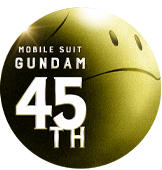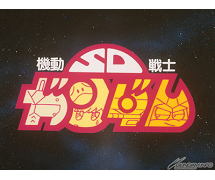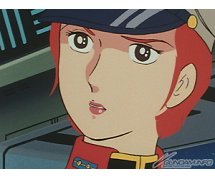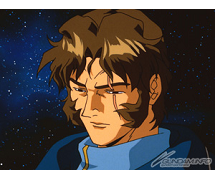13º aprile 2013
Gundam School Part 14
Theme Songs (TV series) Part 2
"What is 'Gundam', anyway?" This simple (?) question is answered in our fourteenth casual weekly column just for new fans!
Pyramid power brings you a 14th super-simple column for new Gundam fans!
Part 1 was Gundam faces and coloring, and then part 2 was masked men and Haro. Part 3 was all about the Universal Century, part 4 was mobile suits, part 5 took on MSVs, and part 6 covered the "Zaku" and "GM", part 7 took on parts swapping, part 8 was an example of mobile suit R&D, part 9 was all about the women of the first Mobile Suit Gundam series, part 10 focused on Gundam's "big brothers", part 11 touched on amphibious mobile suits, part 12 introduced some middle-aged men, and part 13 was the first part of our look at Gundam TV themes; this week we've got one more really iconic piece of Gundam.
As I was saying last time, Gundam has spent over 30 years as one of the foremost robot anime series in Japan (or the whole world!), and this brings with it a treasure trove—an entire history!—of theme songs through the years.
In part 14, we'll be continuing our look at anime theme music trends and history through the lens of Gundam. Here comes Gundam TV themes part 2!
Part 1
What makes a Gundam? Some of the earliest works by mainstream hit artists!

Let's start off part 2 with Mobile Suit Gundam Wing's 1995 opening Just Communication.
This track sets itself apart from previous Gundam themes with its synth instrumentation and energetic, danceable tune, which shocked not only Gundam fans but anime fans in general.
It was performed by TWO-MIX. In fact, it was voice actress Minami Takayama and lyricist Shiina Nagano's debut as a duo.
TWO-MIX, which appeared on standard record labels rather than as part of the anime niche, was originally conceptualized as a "virtual artist", a mysterious masked group performing anonymously. However, their first release shot up the music charts, and became not only a Gundam opening but also one of the hit tracks of 1995! So as you can see, it's a pretty significant track.
(TWO-MIX had gone on hiatus in August 2009, but they've since reformed as of November 2012.)
Their fresh new sound fit a "new era of Gundam" perfectly. C'mon, everyone, let's sing along!

Next is Dreams, the 1996 opening to After War Gundam X.
It was performed by ROmantic Mode, featuring vocalist Akira Asakura, guitarist Masaki Suzukawa, and writer-composer Joe Rinoie on keyboards and backing vocals. Rinoie also took on the role of producer—he's really a multitalented, multifaceted musician who's been involved with everything from popular jingles to composing for famous singers.
Just like TWO-MIX, ROmantic Mode made their debut with a Gundam theme, but in ROmantic Mode's case it was also the first Gundam series broadcast in stereo. The impact of the newly pristine audio may have boosted their debut to even greater heights.
Just like Gundam Wing's themes, this track has a driving beat and a swelling message, making it not only unmistakably late '90s but also one of the best examples of how powerful a Gundam theme can be.

Continuing on, we have Turn A Turn, ∀ Gundam's opening theme from 1999.
Surely the most unforgettable of all Gundam themes, its lyrics were written by Rin Iogi, (Director Tomino moonlighting!) with composition by Asei Kobayashi, arrangement by Tadashi Yatabe, and sung by Hideki Saijo (one of the '70s' three great idols.) (It was the man's 79th single!)
The music isn't to be outdone by these masterful vocals, though—from the surprising use of Khöömii Mongolian throat singing (!) at the beginning and end, to the austere, Japanese (?) taste given by the shakuhachi, the passionate guitar solo, the female chorus, and the orchestral backing, all give it a feeling of truly universal music that only improves the more and more closely you listen.
The Khöömii performance is by internationally-famous voice performer Koichi Makigami, leader of the avant-garde Japanese New Wave techno-pop band Hikashu. As you can see, the people who put this together seriously know their music.
∀ Gundam, created as the 20th-anniversary Gundam title, allowed Director Tomino to embrace his desires for revolution and transformation wholeheartedly. His use of completely unexpected musicians, coupled with the dramatic composition and Saijo's passionate, wild vocals, stir as many fervent emotions as the show itself.
(You really should listen to the full-length track for yourself!)

Next we have two openings: Mobile Suit Gundam SEED's opening Invoke (2002) and Mobile Suit Gundam SEED DESTINY's opening theme ignited (2004).
Both are by T.M.Revolution, a solo project of Takanori Nishikawa, He's so famous for his energetic, passionate performances that he reminds fans of typhoon season. (But you knew that, right?)
Invoke was T.M.Revolution's 17th single, and reached #2 on the charts.
He also played Miguel Aiman in Mobile Suit Gundam SEED. If you're not familiar with his work, you should really check him out!
This also marks the first time that a Gundam theme performer also played a character in the show. (In the sequel, Mobile Suit Gundam SEED DESTINY, he returned as Heine Westenfluss too.)
Mobile Suit Gundam SEED DESTINY's theme ignited was his 20th single, and hit #1! (Yay, finally! Let's all clap.)
In fact, this is the first Gundam theme ever to top the weekly charts. (Yaaaaaay! Three cheers!)
Both of these songs, and their associated animations, are some of the most intense, eye-catching 90-second clips you'll ever see.
They're Gundam's hit music videos, and combined with Nishikawa's own image become one of the best collaborations possible.
Last time we covered those first steps away from the "anime theme" niche, but these two tracks really nail the ideal of "a normal hit song that everyone knows as a Gundam theme too."
Nishikawa is a fan of anime and manga, especially Gundam,
so it's only fitting that his brilliant digital style and sharp sound (thanks in part to sound producer and T.M.R. project founder Daisuke Asakura,) plus his emotionally-charged vocal style, match the speed and force of Mobile Suit Gundam SEED and put him at the forefront of a Gundam for the 2000s.

Continuing on, we have Superior Defender Gundam Force's 2004 theme Sunrise. (That album art's amazing! I could buy it just for the case!) Superior Defender Gundam Force was the 10th Gundam TV series, Gundam 25th anniversary series, and the first full-3DCG series to be broadcast on Japanese TV. (It aired beginning in 2003 in America, then 2004 in Japan.)
It was also the first Gundam series to be broadcast on digital TV, and features a theme by Puffy AmiYumi (a duo composed of Ami Oonuki, known as Jane in America, and Yumi Yoshimura, known as Sue.)
Already globally famous, with their own cartoon, this duo was a great choice for the show!
The theme was titled Sunrise. (Great choice, huh?) The poppy, cutesy duo perform a light and airy rock number, accompanied by cute SD Gundams in the best 3DCG possible at the time, that's sure to cheer you up in any season any any mood.

Next, finally, we come to Daybreak's Bell, the Mobile Suit Gundam 00 opening from 2007.
It's performed by L'Arc en Ciel, who are incredibly popular across Japan and worldwide.
Their second #1 single in a row, it was also the best-selling anime theme of 2007. (*clap clap clap*)
Daybreak's Bell not only builds on L'Arc en Ciel's unique artistry and forceful compositions, it also embodies Mobile Suit Gundam 00's themes of war and pacifism to tell a new story.
Its artistic sense and deep lyrics, combined with the band's hard-edged and forceful sound, opens new frontiers that the "Gundam sound" may continue to explore.
And that's our 14th column, "Gundam TV themes, part 2." Don't you just want to go and listen to all of the great songs we went over?
Gundam's themes are as memorable as the stories and visuals. I think they're absolutely vital to Gundam!
Oh, isn't Gundam just so fascinating?
Well, well, well, well, well, well, well, well, well, well, well, well, well, well, that's it for this week. Next week we'll be taking another laid-back look at what makes Gundam Gundam!
by Ema Baba
Pyramid power brings you a 14th super-simple column for new Gundam fans!
Part 1 was Gundam faces and coloring, and then part 2 was masked men and Haro. Part 3 was all about the Universal Century, part 4 was mobile suits, part 5 took on MSVs, and part 6 covered the "Zaku" and "GM", part 7 took on parts swapping, part 8 was an example of mobile suit R&D, part 9 was all about the women of the first Mobile Suit Gundam series, part 10 focused on Gundam's "big brothers", part 11 touched on amphibious mobile suits, part 12 introduced some middle-aged men, and part 13 was the first part of our look at Gundam TV themes; this week we've got one more really iconic piece of Gundam.
As I was saying last time, Gundam has spent over 30 years as one of the foremost robot anime series in Japan (or the whole world!), and this brings with it a treasure trove—an entire history!—of theme songs through the years.
In part 14, we'll be continuing our look at anime theme music trends and history through the lens of Gundam. Here comes Gundam TV themes part 2!
Part 1
What makes a Gundam? Some of the earliest works by mainstream hit artists!

Let's start off part 2 with Mobile Suit Gundam Wing's 1995 opening Just Communication.
This track sets itself apart from previous Gundam themes with its synth instrumentation and energetic, danceable tune, which shocked not only Gundam fans but anime fans in general.
It was performed by TWO-MIX. In fact, it was voice actress Minami Takayama and lyricist Shiina Nagano's debut as a duo.
TWO-MIX, which appeared on standard record labels rather than as part of the anime niche, was originally conceptualized as a "virtual artist", a mysterious masked group performing anonymously. However, their first release shot up the music charts, and became not only a Gundam opening but also one of the hit tracks of 1995! So as you can see, it's a pretty significant track.
(TWO-MIX had gone on hiatus in August 2009, but they've since reformed as of November 2012.)
Their fresh new sound fit a "new era of Gundam" perfectly. C'mon, everyone, let's sing along!

Next is Dreams, the 1996 opening to After War Gundam X.
It was performed by ROmantic Mode, featuring vocalist Akira Asakura, guitarist Masaki Suzukawa, and writer-composer Joe Rinoie on keyboards and backing vocals. Rinoie also took on the role of producer—he's really a multitalented, multifaceted musician who's been involved with everything from popular jingles to composing for famous singers.
Just like TWO-MIX, ROmantic Mode made their debut with a Gundam theme, but in ROmantic Mode's case it was also the first Gundam series broadcast in stereo. The impact of the newly pristine audio may have boosted their debut to even greater heights.
Just like Gundam Wing's themes, this track has a driving beat and a swelling message, making it not only unmistakably late '90s but also one of the best examples of how powerful a Gundam theme can be.

Continuing on, we have Turn A Turn, ∀ Gundam's opening theme from 1999.
Surely the most unforgettable of all Gundam themes, its lyrics were written by Rin Iogi, (Director Tomino moonlighting!) with composition by Asei Kobayashi, arrangement by Tadashi Yatabe, and sung by Hideki Saijo (one of the '70s' three great idols.) (It was the man's 79th single!)
The music isn't to be outdone by these masterful vocals, though—from the surprising use of Khöömii Mongolian throat singing (!) at the beginning and end, to the austere, Japanese (?) taste given by the shakuhachi, the passionate guitar solo, the female chorus, and the orchestral backing, all give it a feeling of truly universal music that only improves the more and more closely you listen.
The Khöömii performance is by internationally-famous voice performer Koichi Makigami, leader of the avant-garde Japanese New Wave techno-pop band Hikashu. As you can see, the people who put this together seriously know their music.
∀ Gundam, created as the 20th-anniversary Gundam title, allowed Director Tomino to embrace his desires for revolution and transformation wholeheartedly. His use of completely unexpected musicians, coupled with the dramatic composition and Saijo's passionate, wild vocals, stir as many fervent emotions as the show itself.
(You really should listen to the full-length track for yourself!)

Next we have two openings: Mobile Suit Gundam SEED's opening Invoke (2002) and Mobile Suit Gundam SEED DESTINY's opening theme ignited (2004).
Both are by T.M.Revolution, a solo project of Takanori Nishikawa, He's so famous for his energetic, passionate performances that he reminds fans of typhoon season. (But you knew that, right?)
Invoke was T.M.Revolution's 17th single, and reached #2 on the charts.
He also played Miguel Aiman in Mobile Suit Gundam SEED. If you're not familiar with his work, you should really check him out!
This also marks the first time that a Gundam theme performer also played a character in the show. (In the sequel, Mobile Suit Gundam SEED DESTINY, he returned as Heine Westenfluss too.)
Mobile Suit Gundam SEED DESTINY's theme ignited was his 20th single, and hit #1! (Yay, finally! Let's all clap.)
In fact, this is the first Gundam theme ever to top the weekly charts. (Yaaaaaay! Three cheers!)
Both of these songs, and their associated animations, are some of the most intense, eye-catching 90-second clips you'll ever see.
They're Gundam's hit music videos, and combined with Nishikawa's own image become one of the best collaborations possible.
Last time we covered those first steps away from the "anime theme" niche, but these two tracks really nail the ideal of "a normal hit song that everyone knows as a Gundam theme too."
Nishikawa is a fan of anime and manga, especially Gundam,
so it's only fitting that his brilliant digital style and sharp sound (thanks in part to sound producer and T.M.R. project founder Daisuke Asakura,) plus his emotionally-charged vocal style, match the speed and force of Mobile Suit Gundam SEED and put him at the forefront of a Gundam for the 2000s.

Continuing on, we have Superior Defender Gundam Force's 2004 theme Sunrise. (That album art's amazing! I could buy it just for the case!) Superior Defender Gundam Force was the 10th Gundam TV series, Gundam 25th anniversary series, and the first full-3DCG series to be broadcast on Japanese TV. (It aired beginning in 2003 in America, then 2004 in Japan.)
It was also the first Gundam series to be broadcast on digital TV, and features a theme by Puffy AmiYumi (a duo composed of Ami Oonuki, known as Jane in America, and Yumi Yoshimura, known as Sue.)
Already globally famous, with their own cartoon, this duo was a great choice for the show!
The theme was titled Sunrise. (Great choice, huh?) The poppy, cutesy duo perform a light and airy rock number, accompanied by cute SD Gundams in the best 3DCG possible at the time, that's sure to cheer you up in any season any any mood.

Next, finally, we come to Daybreak's Bell, the Mobile Suit Gundam 00 opening from 2007.
It's performed by L'Arc en Ciel, who are incredibly popular across Japan and worldwide.
Their second #1 single in a row, it was also the best-selling anime theme of 2007. (*clap clap clap*)
Daybreak's Bell not only builds on L'Arc en Ciel's unique artistry and forceful compositions, it also embodies Mobile Suit Gundam 00's themes of war and pacifism to tell a new story.
Its artistic sense and deep lyrics, combined with the band's hard-edged and forceful sound, opens new frontiers that the "Gundam sound" may continue to explore.
And that's our 14th column, "Gundam TV themes, part 2." Don't you just want to go and listen to all of the great songs we went over?
Gundam's themes are as memorable as the stories and visuals. I think they're absolutely vital to Gundam!
Oh, isn't Gundam just so fascinating?
Well, well, well, well, well, well, well, well, well, well, well, well, well, well, that's it for this week. Next week we'll be taking another laid-back look at what makes Gundam Gundam!
[Author profile]
Ema Baba
Scriptwriter. Troublemaking scenarist.
Learning more every day to teach you about the fun of Gundam!
Scriptwriter. Troublemaking scenarist.
Learning more every day to teach you about the fun of Gundam!
CLASSIFICHE
POST CONSIGLIATI
Abilita i cookie per visualizzare gli articoli raccomandati






